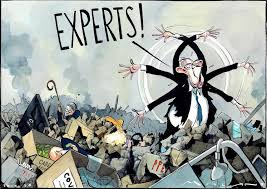
Public discussions of the coronavirus agree that we must “follow science” first and foremost. The names of Galileo, Newton, and Einstein immediately come to mind. They looked for the enduring laws of nature to get beyond error-prone and self-serving human understanding. The mathematical underpinning of reality guarantees authority.
But the numbers that are compiled from data collection are a different story. Like polls, statistics can be manipulated by those who design the data-collection project, often knowing well in advance exactly what results they want to elicit. Polling machines know what segment of the population can be supportive, for or against. As we know from voting campaigns dealing with initiatives, the wording is often little better than mumbo jumbo. Black can appear white. Do self-respectful persons really “pick up” a telephone survey, robo or otherwise?
The social “sciences” themselves are not being sufficiently policed for accuracy or bias. After all, most are headquartered within the academic establishment, long since purged of conservatives. Same goes for the mainstream media. Places like Rapid City, South Dakota, don’t have a single television news source that isn’t aligned with liberal orthodoxy—that is, the free or no-pay broadcasting that most of the public consumes. The unelected, invisibly and narrowly owned CBS, NBC, ABC, PBS, and BBC offer the same political stance. There’s no national FoxNews alternative that’s free locally.
Every day reports come in about COVID-19 deaths being falsified. Old age itself is a precondition of most daily dying–built right into all life on earth–but is never mentioned if funding is sought for this or that medical condition. Every do-gooder charity out there has a far-flung infrastructure that satisfies employee salaries and near plush working conditions, not to mention power bases for community influence. Our proliferation of food-and-housing welfare programs actually undermines people’s own innate bootstrapping abilities and self-reliance. Families are becoming wards of the state.
Not everyone goes online. Many middle-class refuse to pay for unvarnished television-based truth, especially if their tax dollars are already supposed to guarantee an FCC that is independent of any political party. Seemingly private-sector commercials and programming appear to have been generated by the Democratic Party.
Einstein’s theory of relativity is the most weighty of our hard sciences, but it too was long ago hijacked by Marxist-oriented academic communities, along with the social sciences and humanities. Knowledge and history and scientific truth is now filtered through postmodernism, the insidious tool that has overthrown everything conservative, traditional, and historical. Good and bad have changed places. The public has little idea.
Now we don’t question that governments, in the name of COVID-19, shut the doors of churches and schools. In the name of safety, really? Now it seems just fine that parents aren’t shamed that they can’t feed their own children or house themselves (which they can). Enter charities like school lunch programs and vast feeding welfare warehouses, not to mention misguided churches. Now people can collect unemployment checks, wait for food to be delivered to their doors, and sign up for free housing.
Novelist John Steinbeck saw the end of journalism as he practiced it in 1962 when he published Travels with Charley in Search of America. Thanks to the just-then advent of network television and the postmodernist interpretation of “relativity,” news reporting had changed forever: “On the long journey doubts were often my companions. I’ve always admired those reporters who can descend on an area, talk to key people, ask key questions, take samplings of opinions, and then set down an orderly report very like a road map. What I set down here is true until someone else passes that way and rearranges the world in his own style.”
Poltically neutral journalist Bill Steigerwald used Amazon’s Kindle to published his ideas about Steinbeck’s travel book, noting that 1962 was the fulcrum between modernism and postmodernism: “Little remains of the country Steinbeck was determined to rediscover. In 1960 the USA was as simple as ABC, CBS and NBC, the only national networks its people were permitted by federal communications law to watch. Stuck in a MAD nuke-rattling Cold War with the Soviet Union, the country had changed dramatically since the Depression and the end of World War II. But it was essentially still a collection of disparate regions with their own funny accents, strange foods, local laws, favorite kinds of music and distinct subcultures. About the only thing every region could agree on was the importance preserving their own socioeconomic and cultural status quo.”

